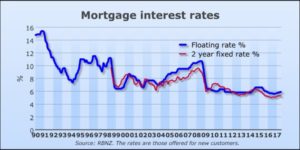
So should you fix? Should you float? Or do a bit of both?
If you’re toying with this question you’re certainly not alone. Homeowners across the nation are debating what’s the best move to make. And unfortunately there’s no clear-cut right or wrong answer. The only way to get the right result is to weigh up your priorities and choose the rate and term that suits you best. Consider the following:
Fig 1 — Mortgage interest rates — since 1990
The graph shows the significant fall in mortgage interest rates that occurred from the early 1990s. Mortgage rates peaked at 20.5% in June 1987.
What’s so great about a fixed rate?
With a fixed rate you can budget for your repayments with real certainty as, regardless of interest rate changes, your repayments will be the same over a fixed term. What’s more, if you’d like to increase the amount you repay by up to $1,000 a month you can do so without any penalties as long as those increased payments remain for the fixed rate period. (It’s important to note that not all lenders offer this).
Why go for a floating rate?
At the moment floating rates are lower than fixed rates, making them the cheapest way to borrow money. They’re also more flexible if at any time you want to make additional payments on your loan. The unfortunate thing is that floating rates can change at any time, which means that your regular repayments will change too.
What’s best for your budget?
Have a think about all the implications of rate increases. If your regular repayments rise how will this impact your other financial commitments and what will it mean for other lifestyle costs such as holidays and entertainment.
What’s certainty worth?
Sure, fixing your loan currently costs a little more, but over the lifespan of a mortgage the price difference between floating and fixing is likely to be minimal. Is this cost worthwhile when it comes to knowing exactly what your regular repayments will be.
Look ahead
If it’s likely that you’ll be able to make a lump sum payment on your loan in the near future, or perhaps selling your home, then it’s a good idea to keep a floating rate or perhaps only fix for a short term.
Could you go 50/50 (or 80/20 or 60/40 or whatever…)?
Splitting your loan between a fixed and a floating rate is a popular option as you can secure a balance between certainty and flexibility. How you split the loan is up to you.
The pros and cons –
Short term – Floating, 6 months, 1 year
Advantages
- It’s good for now: At the moment floating rates are the lowest of all and short-term rates are also pretty low. Choosing a short-term or floating rate means you’ll pay less for your loan in the short term.
- It could be good down the track too: If the OCR is raised more gradually than anticipated short-term and floating rates will continue to stay low.
- It’s on your terms: With a floating rate you can choose to make extra repayments if you please, and you can lock in a fixed term rate whenever you fancy.
- You could miss out: With a 1-year term you could get fewer benefits than a 2-year term if rates go up as expected.
Disadvantages
- You could miss out: With a 1-year term you could get fewer benefits than a 2-year term if rates go up as expected
Medium term – 18 months, 2 years, 3 years
Advantages
- Certainty: You will know exactly what your payments will be no matter what the interest rates do.
- It’s low: The 3-year rate is unlikely to stay as low as it is now, so if you’d like to know what your repayments will be in three years time this could be a good time to lock it in.
- You could pay more: If the OCR increases more gradually than anticipated you could pay interest at a higher rate for longer than you need to.
- You could get locked in the middle of an upward moving cycle.
Disadvantages
- You could pay more: If the OCR increases more gradually than anticipated you could pay interest at a higher rate for longer than you need to
- You could get locked in the middle of an upward moving cycle.
Long term – 4 years, 5 years
Advantages
- Certainty: You will know exactly what your payments will be no matter what the interest rates do.
- You could pay more: If the OCR increases more gradually than anticipated you could pay interest at a higher rate for longer than you need to
Disadvantages
- You could pay more: If the OCR increases more gradually than anticipated you could pay interest at a higher rate for longer than you need to.
If you wish to review your mortgage and want to discuss any aspect of the above, I would be more than happy to have a chat over the phone, or make a time to meet.
